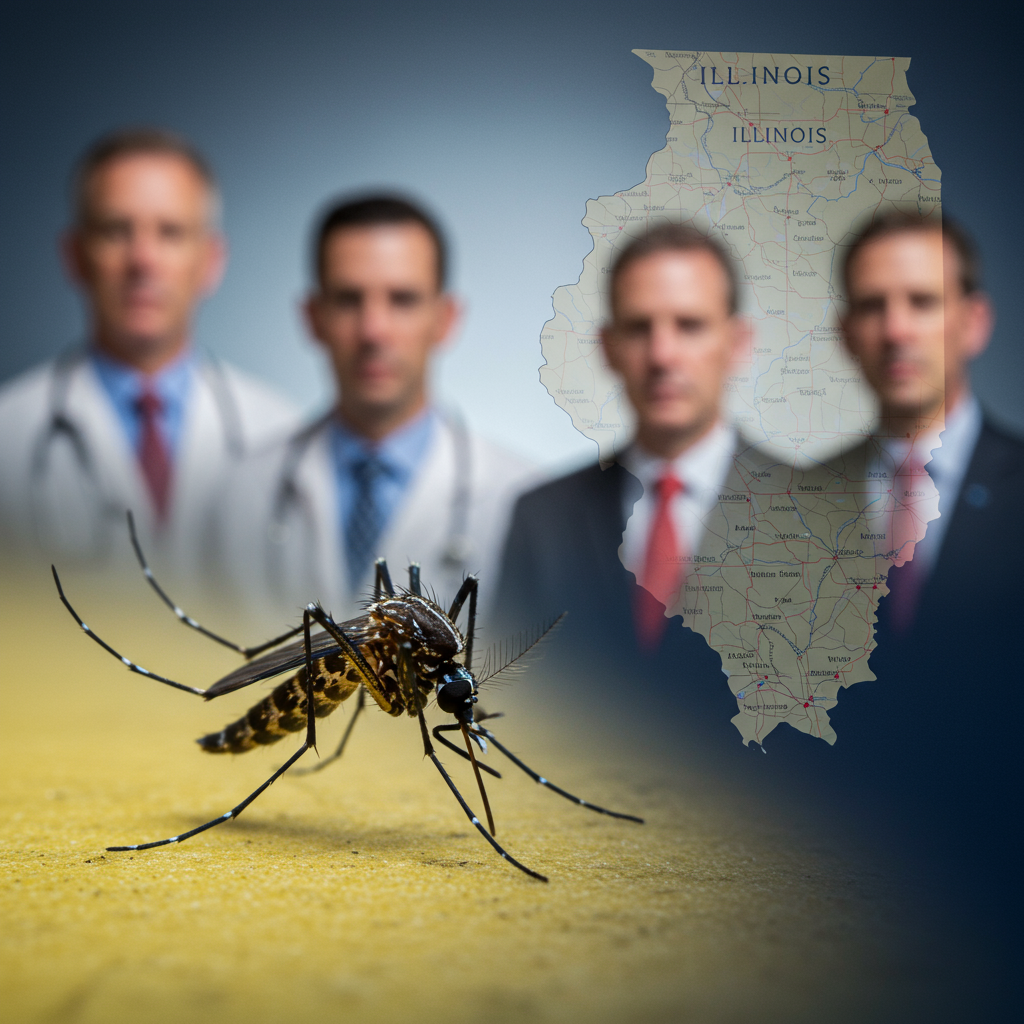Illinois health officials have announced the state’s first confirmed human case of West Nile Virus (WNV) for 2025. The case was identified in a resident of Wayne County, marking the earliest onset of human illness from the virus seen in Illinois since 2016.
According to confirmations by both the Wayne County Health Department and the Centers for Disease Control and Prevention (CDC), the individual required hospitalization due to complications from the infection but has since been discharged and is recovering at home.
Understanding West Nile Virus
West Nile Virus is a bloodborne illness transmitted to humans primarily through the bite of an infected Culex mosquito, often referred to as the common house mosquito. Mosquitoes contract the virus by feeding on infected birds. It’s important to note that WNV is not transmitted from person to person, through the air, or through casual contact.
Most people infected with WNV will not experience any symptoms. However, for those who do, symptoms can range from mild to severe. Mild symptoms, which often mimic other viral illnesses, can include:
Fever
Headache
Body aches and muscle aches
Joint pain
Nausea
Diarrhea
Rash
These symptoms typically last for a few days to a few weeks. In rare instances, WNV can cause severe neurological illness affecting the brain, spinal cord, and nerves. These severe conditions, such as meningitis (inflammation of the membranes around the brain and spinal cord), encephalitis (brain inflammation), or paralysis, can be serious and potentially fatal.
Individuals at the highest risk for developing severe complications are those over the age of 60 and people with weakened immune systems. Currently, there is no vaccine or specific treatment available for West Nile Virus; recovery is dependent on the individual’s immune response.
Widespread Virus Activity Across Illinois
While this is the first human case reported this year, West Nile Virus activity has already been detected across Illinois. So far in 2025, 19 counties have reported positive findings of WNV in mosquitoes, birds, or human cases. Wayne County is among these 19 counties, located furthest south. The first WNV-positive mosquito batch of the year was detected in Rockford on May 9th.
Last year, Illinois saw significantly more widespread activity, with WNV confirmed in 72 counties throughout 2024. The state recorded 69 human cases in 2024, resulting in 13 deaths – the highest number of human cases since 2018. This history underscores the ongoing threat the virus poses each season, which typically lasts until about the middle of September.
Public Health Officials Urge Vigilance
This early human case serves as a critical reminder for all Illinois residents to take precautions against mosquito bites.
“The fact that we are seeing the first human case of West Nile virus so early in the season serves as a timely reminder—especially for seniors and those with weakened immune systems—to protect yourself from illnesses caused by mosquito bites,” said IDPH Director Dr. Sameer Vohra. “I encourage all Illinoisans to ‘Fight the Bite’ and take precautions to protect themselves and their loved ones.”
Shawnna Rhine, Community Outreach Coordinator for the Southern Seven Health Department, also emphasized vigilance, particularly for residents in southern Illinois and southeast Missouri. She reminded the public that children and pets are also susceptible to contracting the virus and should be protected. She advised contacting a doctor if persistent symptoms occur to determine if West Nile Virus is the cause.
“Fight the Bite”: Key Prevention Steps
To help prevent West Nile Virus infection, the Illinois Department of Public Health (IDPH) strongly advises following three key prevention steps: Reduce, Repel, and Report.
REDUCE: Minimize mosquito exposure and breeding grounds.
Avoid the outdoors during peak mosquito activity, typically from dusk to dawn.
Ensure doors and windows have intact, tight-fitting screens and keep them shut to prevent mosquitoes from entering your home.
Eliminate all sources of standing water around your property where mosquitoes lay eggs. This includes emptying water weekly from bird baths, clogged gutters, ponds, wading pools, old tires, buckets, and any other containers that can hold water.
REPEL: Protect yourself from bites when outdoors.
Wear appropriate clothing, such as shoes, socks, long pants, and light-colored, long-sleeved shirts, especially when outdoors during dusk and dawn.
Apply an EPA-registered insect repellent containing recommended active ingredients like DEET, picaridin, oil of lemon eucalyptus, IR3535, para-menthane-diol (PMD), or 2-undecanone, following label instructions carefully. Consult a physician before using repellents on infants.
REPORT: Help authorities identify and address mosquito threats.
Notify local health departments or city governments about locations with stagnant water that cannot be eliminated (e.g., neglected swimming pools, drainage issues, roadside ditches) and has been present for over a week. Reporting these sites may allow for larvicide application to kill mosquito larvae.
* Report dead birds without an obvious cause of death to your local health department, as testing birds can help track where the virus is circulating.
To support these efforts, the IDPH is providing $2.8 million in funding to local health departments across the state for mosquito control activities, including surveillance, larvicide application, and public education.
For more detailed information about West Nile Virus and prevention, visit the Illinois Department of Public Health’s website.



